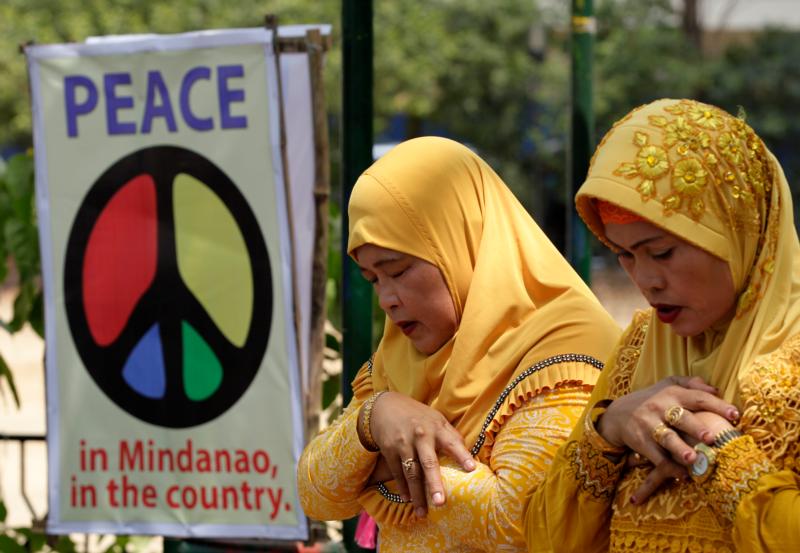
Muslims pray during the ‘All-out-peace’ campaign in 2015 near Manila, Philippines. The campaign aims to take a stand for peace by any form of armed violence or war as a response to the Mindanao island conflicts in southern Philippines. (CNS photo/Ritchie B. Tongo, EPA)
by Simone Orendain
COTABATO CITY, Philippines (CNS) — Two years after the Philippine government and the country’s largest Muslim rebel group signed a peace agreement, church activists expressed determination to press forward with peacebuilding, despite significant challenges.
Philippine lawmakers failed to pass legislation called the Bangsamoro Basic Law before they went on break to campaign for May elections. The proposal calls for the creation of an autonomous region in the impoverished Muslim-majority part of Mindanao Island in the country’s South.
The next president will oversee the peace process, but with the proposed law’s fate hanging, some sectors fear a return to arms.
Sister Arnold Maria Noel, a member of the Holy Spirit Missionary Sisters, whose nongovernmental agency addresses psychological needs of residents displaced by conflict, said she is bracing for that possibility.
“What will the Muslims feel? They will feel that they were not respected because what they asked [for] was not given to them,” she said.
The Moro Islamic Liberation Front “belongs already to the older generation. They will not go back to war, but how about the younger people? The younger people will say it’s useless to negotiate with government, because in the end nothing happened,” Sister Noel told Catholic News Service.
But at the second anniversary commemoration of the peace deal at Notre Dame University, Oblate Father Roberto Layson said he was not deterred by the failed proposal or the impending change in administration.
Father Layson has experienced four wars in a six-year period. He leads interreligious seminars and helped form a “zone of peace” in his town of Pikit. He said Christians and Muslims come together in this zone to try to understand each other’s differences, and he said they often leave grateful for what they have learned.
“Even if we don’t know who heads this country again and who will be the local politicians … we will continue to advocate for peace,” he told Catholic News Service. “If we believe our product is good, we have to promote it, so that people will know it and people will buy it. Advocacy is very important, so we should not surrender.”
Peace workers with the Catholic Community of Sant’Edigio also said they would forge ahead despite the setback. The community is one of several international nongovernmental agencies that help mediate between the Philippine government and the Muslim rebels.
Mary Grace Candol, Sant’Egidio national representative in the Philippines, told CNS residents in the conflict-affected areas were not very clear on what the peace process was about and did not have enough of an understanding of the proposed law.
“We want to pursue educating people, not only the people of Mindanao but at the same time even overseas with our organizations, even in Manila. We are pushing a series of conferences … so they will have an understanding [of the process] and not just rely on hearsay,” she said.
But even as government and Moro Islamic Liberation Front officials rolled out the peace pact’s decommissioning program last June, CNS spoke with Christians in Cotabato City whose negative attitudes toward Muslims persisted. At the time, Cotabato Cardinal Orlando Quevedo told CNS such attitudes were difficult to counter and that the proposed basic law needed close scrutiny so that it could have smooth passage and the process could move forward.
The Front’s lead peace negotiator, Mohagher Iqbal, told reporters at Notre Dame his group is sticking with a commitment to pursue the peace process. But he did acknowledge frustration and said he has been traveling throughout the region since February.
“That goes to show that we are really handling the situation,” said Iqbal. “It’s very tough. But it can also show the command and control of the MILF, that our people, our commanders, our combatants as well as members of the MILF are still listening to the MILF.”






